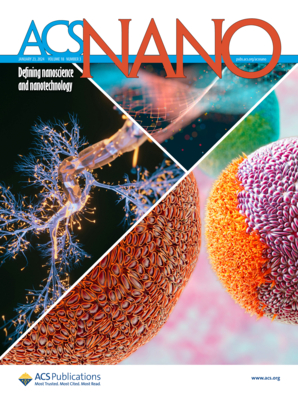IF 15.8
1区 材料科学
Q1 CHEMISTRY, MULTIDISCIPLINARY
引用次数: 0
摘要
基于肽的新抗原疫苗能够诱导持久的肿瘤特异性免疫反应,因此是一种前景广阔的癌症免疫疗法策略。然而,新抗原特异性 T 淋巴细胞活化不足极大地限制了其临床疗效。在这里,我们开发了丝胶配位锌离子修饰的磷酸钙(CP)纳米疫苗,它能协同传递肿瘤抗原多肽和Toll样受体9激动剂(SZCP/APs-CpG),以增强抗原特异性T细胞免疫。SZCP/APs-CpG 纳米疫苗可将抗原多肽和佐剂高效地协同传递给引流淋巴结(dLNs)中的树突状细胞(DCs),通过炎症体依赖性白细胞介素-1β的分泌诱导亢进的DCs,并协调释放的Zn2+诱导的T细胞活化,从而引起强大而持久的抗原特异性T细胞免疫应答。在多种小鼠癌症模型中,SZCP/APs-CpG 疫苗都表现出了强大的抗癌功效和卓越的安全性,当与免疫检查点阻断结合使用时,还能显著保护小鼠免受 B16-OVA 肿瘤的再挑战,并根除小鼠的正位结肠癌。因此,我们的工作提出了一种高效、多用途的纳米疫苗平台,可促进抗原特异性 T 细胞活化,用于癌症免疫治疗。本文章由计算机程序翻译,如有差异,请以英文原文为准。

Zinc Ion-Coordinated Sericin Calcium Phosphate Nanovaccines Induce Hyperactive Dendritic Cells and Synergistic Activation of T Cells for Cancer Immunotherapy
Peptide-based neoantigen vaccines are promising cancer immunotherapy strategies because of their capability to induce durable tumor-specific immune responses. However, insufficient neoantigen-specific T-lymphocyte activation greatly limits their clinical efficacy. Here, we developed sericin-coordinated zinc ion-modified calcium phosphate (CP) nanovaccines that codeliver tumor antigen peptides and a Toll-like receptor 9 agonist (SZCP/APs-CpG) for potentiating antigen-specific T cell immunity. SZCP/APs-CpG nanovaccines could yield efficient codelivery of antigen peptides and adjuvants to dendritic cells (DCs) in draining lymph nodes (dLNs), induce hyperactive DCs depending on the inflammasome-dependent interleukin-1β secretion, and coordinate the released Zn2+-induced T cell activation to elicit robust and durable antigen-specific T cell immune responses. Vaccination with SZCP/APs-CpG exhibited potent anticancer efficacy and superior safety in multiple murine cancer models and significantly protected against B16-OVA tumor rechallenge and eradicated orthotopic colon cancer in mice when combined with immune checkpoint blockade. Thus, our work presents an efficient and versatile nanovaccine platform for boosting antigen-specific T cell activation for cancer immunotherapy.
求助全文
通过发布文献求助,成功后即可免费获取论文全文。
去求助
来源期刊

ACS Nano
工程技术-材料科学:综合
CiteScore
26.00
自引率
4.10%
发文量
1627
审稿时长
1.7 months
期刊介绍:
ACS Nano, published monthly, serves as an international forum for comprehensive articles on nanoscience and nanotechnology research at the intersections of chemistry, biology, materials science, physics, and engineering. The journal fosters communication among scientists in these communities, facilitating collaboration, new research opportunities, and advancements through discoveries. ACS Nano covers synthesis, assembly, characterization, theory, and simulation of nanostructures, nanobiotechnology, nanofabrication, methods and tools for nanoscience and nanotechnology, and self- and directed-assembly. Alongside original research articles, it offers thorough reviews, perspectives on cutting-edge research, and discussions envisioning the future of nanoscience and nanotechnology.
 求助内容:
求助内容: 应助结果提醒方式:
应助结果提醒方式:


